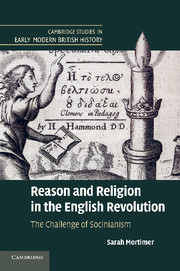Book contents
- Frontmatter
- Contents
- Acknowledgements
- Abbreviations and conventions
- Introduction
- 1 The Socinian challenge to Protestant Christianity
- 2 Socinianism in England and Europe
- 3 The Great Tew Circle: Socinianism and scholarship
- 4 Royalists, Socinianism and the English Civil War
- 5 Socinianism and the Church of England
- 6 Reason, religion and the doctrine of the Trinity
- 7 Anti-Trinitarianism, Socinianism and the limits of toleration
- 8 Socinianism and the Cromwellian Church settlement
- Conclusion: the legacy of Socinianism
- Bibliography
- Index
Conclusion: the legacy of Socinianism
Published online by Cambridge University Press: 05 May 2010
- Frontmatter
- Contents
- Acknowledgements
- Abbreviations and conventions
- Introduction
- 1 The Socinian challenge to Protestant Christianity
- 2 Socinianism in England and Europe
- 3 The Great Tew Circle: Socinianism and scholarship
- 4 Royalists, Socinianism and the English Civil War
- 5 Socinianism and the Church of England
- 6 Reason, religion and the doctrine of the Trinity
- 7 Anti-Trinitarianism, Socinianism and the limits of toleration
- 8 Socinianism and the Cromwellian Church settlement
- Conclusion: the legacy of Socinianism
- Bibliography
- Index
Summary
Socinian ideas – and the challenge they posed – were crucial to intellectual and political developments during the English Revolution and the issue of Socinianism remained very much alive after the Restoration. In the later decades of the seventeenth century they were, however, shaped and modified in important ways. Some of the issues once raised by the Socinians moved into mainstream political and ecclesiastical debate, taking on a life of their own. No longer were the Socinians' ideas about natural right and natural law associated exclusively with Socinianism. At the same time, however, the term ‘Socinian’ came to be associated most strongly with a particular approach to theology, and one which was extremely damaging to such central Christian doctrines as the Trinity. In this final chapter, we will consider how Socinian ideas, and the public perception of Socinianism, altered over the course of the later seventeenth century.
CHRISTIANITY AND NATURAL LAW
Socinus' theology was predicated upon his particular and distinctive views about nature and about freedom. He drove a wedge between nature and Christianity, arguing that religious belief must be freely chosen – and that it could not be free if it were natural. He and his followers drew upon legal language to explain this freedom, suggesting that human beings had rights which they could use as they wanted.
- Type
- Chapter
- Information
- Reason and Religion in the English RevolutionThe Challenge of Socinianism, pp. 233 - 241Publisher: Cambridge University PressPrint publication year: 2010
- 1
- Cited by



